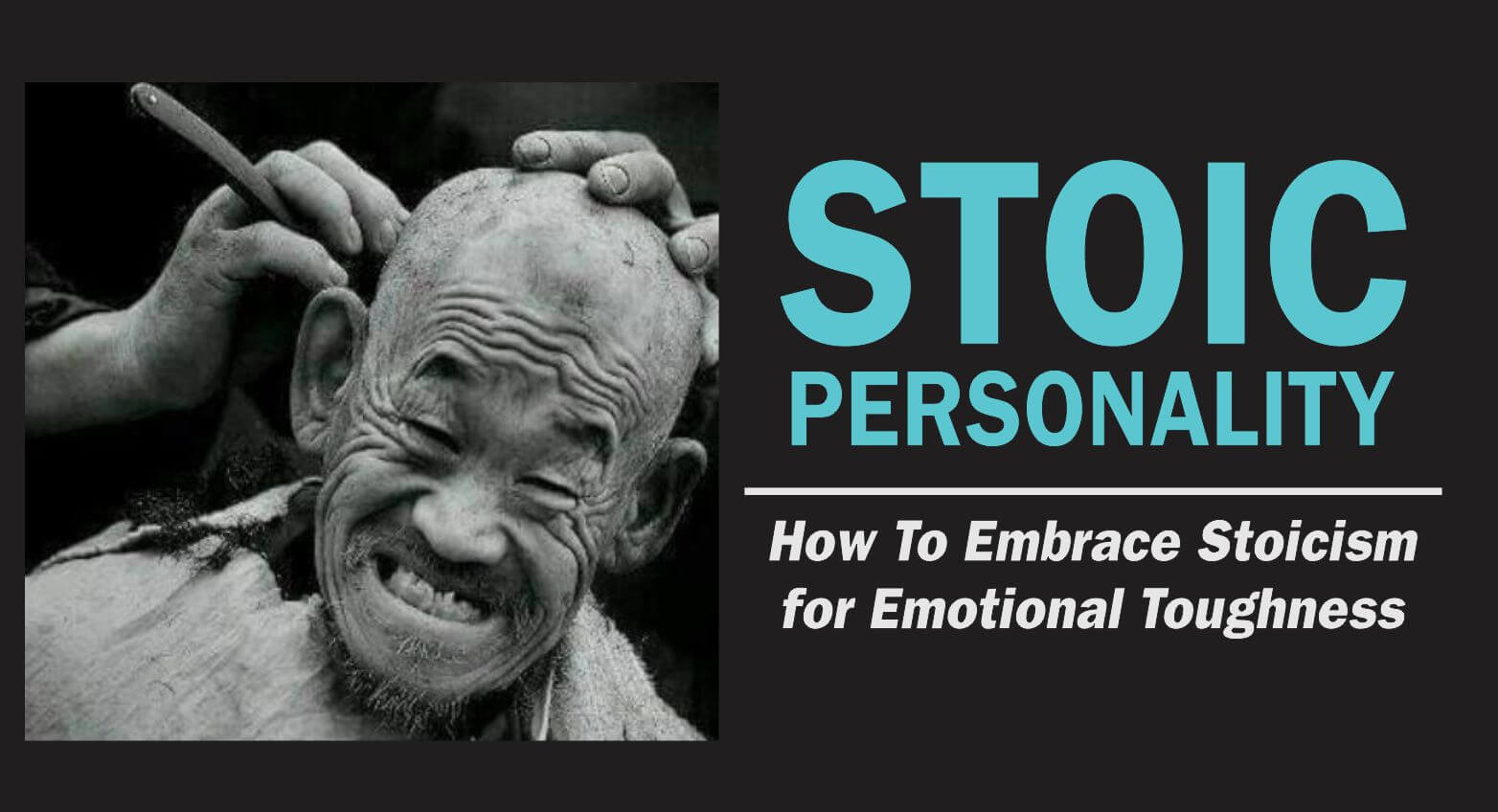Stoicism offers a powerful set of tools for developing mental toughness, stoic personality, and inner resilience in the face of adversity.
In this guide, we have detailed the art of becoming a stoic personality and the key principles behind cultivating inner resilience.
Stoicism, a component of philosophy and wisdom, practiced by ancient Greek and Roman philosophers, offers valuable insights and practical approaches to facing life’s challenges with grace and composure.
By adopting Stoic principles such as maintaining perspective, accepting what is beyond your control, and focusing on your internal virtues, you can cultivate resilience, emotional stability, and a greater sense of tranquility in the face of adversity.
My Stoic Personality Journey
I picked interest in the Stoic life because it resonates with my natural principles in life, and my father’s death further made me embrace Stoicism.
His death sort of steeled me up in a positive way. The pain of his departure made me know the reality of life.
If I can lose my dad, then there is nothing to hold too dear in life.
I approach every situation with this mindset – you win some, you lose some.
Strive for the star, but if your strength is exhausted on the moon, then you don’t have to sulk all day.
You just explore the moon and see what positivity it holds.
For sure, there must be something good in the moon; find it and find happiness in it. That’s the stoic personality.
In this comprehensive article, we’ll explore what Stoicism is, the key principles, what happens when a person is stoic, and how you can incorporate Stoicism into your personal life.
Read about the virtues of Stoicism.
Before we go ahead, though, let’s clear this simple confusion about “Stoic” with the uppercase and “stoic” with the lowercase.
Related: Understanding The Core Principles of Stoicism
Definition of the Stoic Personality
Contrary to what people believe as stoics, it is different from what people call the real man.
Examining a stoic person, you will describe him as unflinching or unperturbed in the face of trouble, but you wish you could see the inside of them.
They could be more worried than you, but have mastered the art of regulating emotions and feigning whatever emotions they prefer or simply keeping a straight face.
Being stoic is not expressing masculinity, but an attribute of humanity that should be paid attention to.
It might look like harmful masculinity or alpha male posture, but it’s far from that. You are not stoic to impress or to earn yourself the alpha male badge.
What is a Stoic Personality?
A stoic personality is a person who is characterized by self-discipline, emotional resilience, and the ability to remain calm and composed in the face of adversity.
Stoic individuals are often seen as having a strong sense of inner peace and can endure hardship without becoming overwhelmed by their emotions.
The ultimate goal is to achieve inner peace and happiness by focusing on what you can control, rather than obsessing over what you can’t.
Now, you might be thinking, “But wait, won’t being stoic make me boring and unfeeling?”
Not at all! …
Being stoic doesn’t mean you never experience emotions or have fun.
It’s about finding a balance between your emotions and your reason, and not letting one overpower the other.
So it’s okay to laugh, cry, shout, and dance all you want, just make sure you’re doing it in a way that aligns with your values and brings you closer to inner peace.
Related: Effects of Stoicism on Modern Men
Watch this video from Stoic Daily by Andrew Kirby:
Stoic Personality Traits
Stoic personalities have traits that differentiate them from everyday people. These characteristics though not exclusive to them, are the basis of their living and source of happiness.
1. Emotional Resilience
If you are stoic, you exhibit emotional resilience, enabling you to rebound from adversity.
You absorb tough situations and emerge stronger, akin to rubber balls enduring impact.
Also, you maintain composure and persevere through challenges, akin to Rocky Balboa, as you are emotionally resilient.
Also Read: Social Intelligence Test
2. Self-mastery
According to the Stoics, the most powerful person is one who controls their mind, not external riches or authority. A person who has attained self-mastery.
Self-mastery involves managing emotions, thoughts, and behaviors to make sound decisions and avoid impulsiveness.
It’s like being the captain of your ship, navigating life’s challenges with calmness and resilience, and also on your terms.
3. Clarity of Thoughts
When a person possesses clarity of thought, they can think objectively, free from emotions and biases.
This calm analysis aids in decision-making and problem-solving. Stoics value this clarity for inner peace, training their minds to remain composed in adversity, enabling them to see reality clearly and find purpose in life.
4. Sense of Purpose
Stoics value a sense of purpose, seeing it as crucial for a fulfilling and virtuous life. They believe each person has a unique role in the universe and that finding and fulfilling this role leads to happiness.
This purpose is not given externally but discovered within, guiding actions and priorities.
It helps us to align our actions with our values and to live by the natural order of the universe.
5. Ability to Let Go
Stoic people do not attach emotions to material things. They are always ready to let go of whatever can deprive them of their happiness.
In the event of a disaster or the loss of a loved one, the stoic would endure and move on quickly because there could be nothing he could do about the situation.
The Stoic person is hardwired to face adversity head-on.
6. Easily Adapts to Change
Change may be very upsetting for many of us. It can be challenging to adjust to even small changes in our way of life.
Sometimes, situations that are new or different like a new job, a new house, or a new routine can utterly knock us off our feet.
However, being stoic usually means expressing resilience and that these things don’t bother you as much as they do other people.
Changes don’t worry them much, if at all, and they can live their lives without too much disruption.
Related: The Importance of More Stoic Men in the World
The Stoic Mindset for Inner Resilience

Just as we have seen above, the Stoic mindset focuses on developing inner resilience and maintaining inner peace in the face of adversity.
It emphasizes acceptance of the dichotomy of control, practicing negative visualization, and embracing a sense of fate or determinism.
Understanding the Dichotomy of Control
Distinguish what is within your Control: Stoics focus on distinguishing between what’s within our control (thoughts, beliefs, actions) and what’s not (others’ actions, external events). This helps avoid wasted energy and emotional turmoil.
Accepting and Embracing What Lies Outside of Your Control: Stoics advocate accepting uncontrollable factors, letting go of specific outcomes, and focusing on personal thoughts, choices, and actions to reduce anxiety and stress.
Practicing Negative Visualization
Cultivating Gratitude and Appreciation for the Present: Stoics advise imagining life without cherished things to cultivate gratitude and contentment. This practice reduces the desire for material possessions and external circumstances, fostering a sense of fulfillment.
Preparing yourself Mentally for Adversity: Negative visualization involves mentally preparing for challenges and adversity, fostering resilience and preparedness. It reduces fear, anxiety, and attachment to specific outcomes.
Developing a Sense of Fate or Determinism
Embracing the Transient Nature of Life: Stoicism emphasizes life’s impermanence and change, encouraging individuals to avoid excessive attachment to people, possessions, or circumstances, and recognizing the transient nature of everything.
Learning to Let Go of Attachments and Expectations: Stoics warn that clinging to attachments and rigid expectations leads to suffering.
By practicing detachment and letting go of expectations, individuals gain inner freedom and resilience, navigating life’s challenges with equanimity.
Related: Using Stoicism to Settle Relationship Fights
Building Inner Strength through Stoicism
Developing a resilient mindset is a key aspect of building inner strength through stoicism.
This mindset can help individuals build resilience and overcome challenges.
Let’s take a look….
The Importance of Virtue and Moral Character
Virtue and moral character are seen as crucial elements in Stoicism for building inner strength.
Stoics believe that developing these virtues enables individuals to live a fulfilling and content life.
Four cardinal virtues in Stoicism aid in the cultivation of moral character:
Wisdom: This virtue involves seeking knowledge and understanding, as well as applying reason to one’s actions and decisions.
It involves recognizing and accepting what is within our control and what is not and making choices based on rationality rather than impulse or emotion.
Courage: Courage is the virtue of facing and overcoming challenges, difficulties, and fears. It involves acting despite the presence of fear, by one’s moral principles.
Temperance: Temperance is the virtue of moderation and self-control. It involves avoiding excessive desires or indulgences and maintaining balance in one’s actions and emotions.
Practicing temperance allows individuals to avoid the pitfalls of excessive pleasure-seeking or indulgence in vices.
Justice: Justice is treating others fairly and with respect. It involves fairness, honesty, and concern for the well-being of others.
Being just means acting in a way that is consistent with moral principles and treating others as equals.
Cultivating Virtue in Daily Life
Cultivating virtue in daily life is an essential practice in Stoicism. It involves actively applying and embodying these virtues in one’s thoughts, words, and actions.
By consciously aligning one’s behavior with these virtues, individuals can strengthen their character and develop inner resilience.
Stoic Exercises for Self-improvement
Stoicism offers various exercises and practices that aim to enhance self-improvement and build inner strength.
Two prominent practices in Stoicism are:
The Discipline of Desire and Aversion
Stoic philosophy involves managing desires and aversions by focusing on what’s within our control, like thoughts and actions, and not being overly averse to external events.
This practice aims to cultivate mental tranquility and reduce unnecessary suffering.
The Dichotomy of Value and Indifference
Stoicism teaches to differentiate between what truly matters (virtue) and indifferent things like wealth or fame.
By focusing on virtue and being indifferent to external factors, individuals can find inner strength and contentment.
Cultivating a Stoic Personality

Practicing Mindfulness
Mindfulness is a potent tool for nurturing a stoic life, involving focused, non-judgmental attention to the present.
It enhances awareness of thoughts and emotions, enabling calm, rational responses.
Stoics view emotions as hindrances to rationality and self-discipline, advocating mindfulness to observe emotions without being overwhelmed.
Developing Emotional Intelligence
Developing emotional intelligence is crucial for a stoic personality.
It involves recognizing, understanding, and managing one’s own emotions and those of others.
This encourages self-consciousness, empathy, and the ability to respond calmly and rationally to challenging situations, aligning with Stoic beliefs about emotions and rationality.
Exercising Self-control
Exercising self-control is fundamental to cultivating a Stoic life.
Stoics emphasize self-mastery and discipline to overcome life’s challenges.
This involves regulating thoughts, emotions, and behaviors, resisting impulsivity, and responding to difficulties rationally, not emotionally.
Practicing Acceptance
Exercising self-control is crucial for a Stoic life. Stoics emphasize discipline and self-mastery to overcome life’s challenges.
This involves regulating thoughts, emotions, and behaviours, resisting impulsivity, and responding to difficulties rationally, not emotionally.
Focusing on Purpose and Virtue
Practicing acceptance is crucial for being stoic. Stoics emphasize focusing on what’s controllable,
letting go of attachment to external outcomes, and cultivating inner strength.
Acceptance involves acknowledging a lack of control and making the best of any situation.
Related: 4 Myths & Misconceptions About Stoicism Debunked
Benefits of Adopting a Stoic Mindset

- Dealing With Stress: The stoic philosophy emphasizes that we can control only a few things in life, and the rest is outside our control. By accepting this reality, we can learn to let go of things that cause stress and focus on what we can control.
- Building Resilience: Stoicism teaches us that adversity is an opportunity to grow and become stronger. By approaching challenging situations with a stoic mindset, we can learn to persevere and develop resilience.
- Achieving Inner Peace: Stoicism encourages individuals to cultivate inner calm by focusing on their thoughts and emotions. By recognizing our negative thoughts and learning to regulate them, we can achieve a state of tranquility and peace.
Also Read: Self-management Skills You Should Master
Stoic Personality Test
To determine your personality, take the Stoic Personality Test. The quiz is consistently updated and is the most accurate of the bunch.
One of the fresh philosophical currents of the Hellenistic period was stoicism.
The name derives from the porch (stoa poikilê) of the Athens Agora, where the school’s lectures were held and which was decorated with mural paintings.
The sage, a person who had attained moral and intellectual perfection, would not experience emotions like fear or envy (or strong sexual attachments or passionate love of anything), according to the Stoics, who also believed that these sensations were or originated from wrong judgments.
Later Stoics of the Roman Imperial era, Seneca and Epictetus, highlight the ideas that the sage is immune to misfortune and that virtue is enough to bring happiness, which was previously signed to the early Stoics’ doctrines.
Frequently Asked Questions on Stoic Personality
What is Stoic Personality?
Stoic Personality is a personality trait characterized by a calm and rational approach to life’s challenges, a focus on personal responsibility and self-improvement, and a commitment to living by one’s values.
What are the key principles of Stoic Personality?
The key principles of stoic life include focusing on what is within one’s control, accepting what is outside of one’s control, practicing self-discipline and self-control, and living by one’s values.
How can I develop a Stoic Personality?
You can develop a stoic mindset by practicing mindfulness, focusing on personal responsibility, practicing self-discipline and self-control, and living by your values.
What are the benefits of having a Stoic Personality?
The benefits include increased resilience, improved emotional regulation, greater self-awareness, and a greater sense of purpose and meaning in life.
Can anyone develop a Stoic Personality, or is it only for certain types of people?
Anyone can develop a stoic life, regardless of their personality type or background.
How does Stoic Personality differ from other personality traits or philosophies?
It differs from other personality traits or philosophies in its emphasis on personal responsibility, self-discipline, and living by one’s values.
Are there any potential drawbacks or limitations to having a Stoic Personality?
One potential drawback of having a stoic life is that it may lead to a lack of emotional expression or a tendency to suppress emotions.
It is important to balance Stoic principles with healthy emotional expression and self-care.
Can Stoic Personality be applied in different areas of life, such as work, relationships, or personal growth?
Yes, it can be applied in different areas of life, such as work, relationships, or personal growth.
The principles of stoic personality can help individuals approach challenges with a calm and rational mindset, take personal responsibility for their actions, and live by their values.
How can I incorporate Stoic principles into my daily life?
You can incorporate Stoic principles into your daily life by practicing mindfulness, focusing on personal responsibility, practicing self-discipline and self-control, and living by your values.
You can also read Stoic philosophy and reflect on how its principles apply to your life.
Final Thought
The Stoic personality, with its emphasis on resilience and inner strength, offers a valuable framework for navigating life’s adversities.
By focusing on what’s within your control, cultivating emotional intelligence, and practicing acceptance without indifference, you can develop a tough yet compassionate mindset.
Stoicism encourages proactive responsibility, adaptability, and kindness toward others.
It’s a philosophy that promotes toughness without callousness, resilience without indifference, and compassion alongside inner strength.
References:
- What Is A Stoic Person?
- What Is Stoicism?
- What Does It Mean For A Man To Be Stoic?
- Greek philosopher, Zeno of Citium
- What is Stoicism?
Pious Clements is the insightful voice behind "The Conducts of Life" blog, where he writes about life ethics, self-development, life mastery, and the dynamics of people and society.
With a profound understanding of human behaviuor and societal dynamics, Pious offers thought-provoking perspectives on ethical living and personal growth.
Through engaging narratives and astute observations, he inspires readers to navigate life's complexities with wisdom and integrity, encouraging a deeper understanding of the human experience and our place within society.

